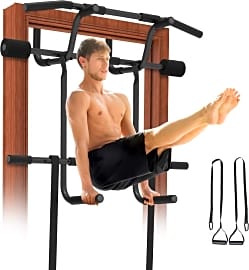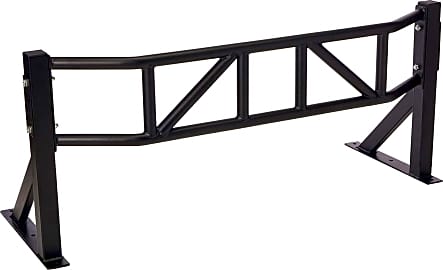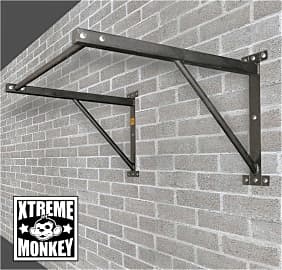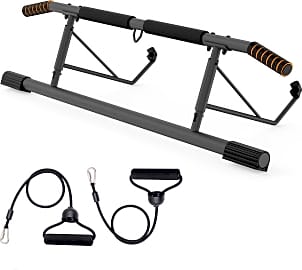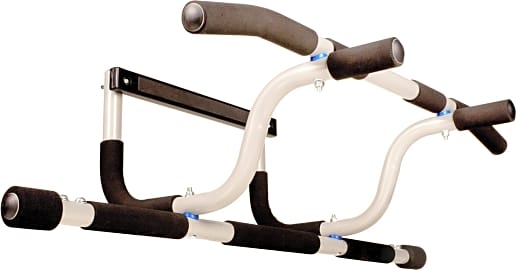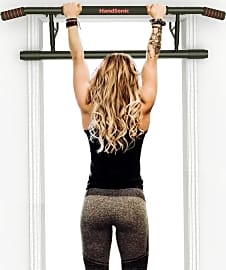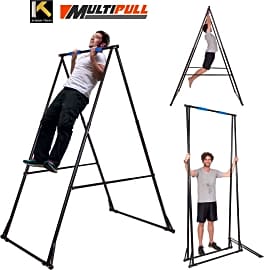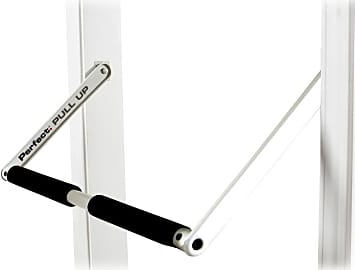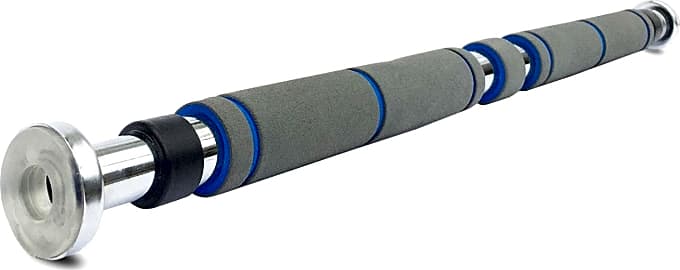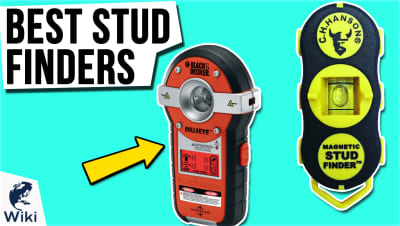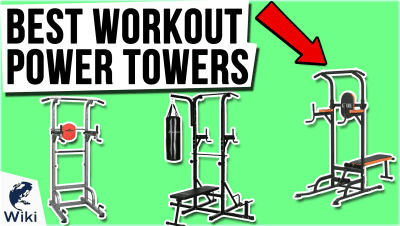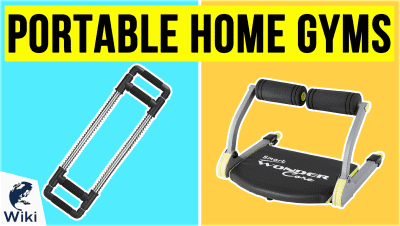The 10 Best Chin-Up Bars

This wiki has been updated 38 times since it was first published in July of 2015. You don't need an expensive gym membership to get a strenuous upper body workout. All you need is one of these sturdy chin-up bars to help reach whatever strength and fitness level you are aiming for. Not only are they great for pull-ups, but some can be used for a variety of other exercises, too, including leg lifts, push-ups, and rows. We've included both temporary and permanent options. When users buy our independently chosen editorial recommendations, we may earn commissions to help fund the Wiki.
Editor's Notes
May 13, 2021:
All of our choices for this category still looked great to us, but we were having trouble tracking down a few options online, so we decided to phase them out in order to make room for a few exciting new selections. In the end, the offerings we eliminated were the Gorilla Gym Power Fitness Package, Ultimate Body Press WMP-20 and Yes4All E. Joist Mounted.
In my personal opinion, the most impressive addition we made this time around was the Odoland Compact Power Tower. Its clever design provides all the utility of a basic power tower in a compressed package that comes with two pairs of hooks, so you can hang it up high to do pull ups or support your TRX straps, or down low to do tricep dips or leg raises. Moving it back and forth between hooks might be a bit of a pain, but if you’re looking for a versatile solution that can offer you an incredible amount of utility for a very affordable price, it’s worth looking into.
If you like the notion of the Odoland option, but aren’t gung ho about the idea of screwing four hooks into your wall, then give some thought to our second new addition: the Redliro Multi Gym. It’s a doorframe model that comes with an extra bar that allows for tricep dips and leg raises, and you should be able to workout with it without marring your home in any way. It also comes with a bonus pair of suspension straps, which further increase its versatility.
Our last new addition was the Ceayun Portable, which is suitable for super-wide 40-inch doorways, and is padded with one-inch foam that your hands are likely to find forgiving. It too comes with suspension straps, and we liked that you can hang it in a clothes closet for storage between sessions, which some will find to be a convenient option.
If you wind up investing in a model that doesn’t allow for leg raises, and you’re looking for ways to develop a shredded abdominal to match your new oversized guns, think about picking up a set of ab straps. They’re an affordable way to get some extra use out of your existing equipment.
March 26, 2020:
When selecting the best chin-up bars, we thought it prudent to include both permanently-mounted and temporary options, as they both have their own pros and cons. When it comes to safety and stability, there is no doubt that permanently-mounted models are going to be at the top of pack. Of course, in order to install one, you'll have to be proficient with using a stud finder and not mind drilling into your wall. You'll also need a suitable place for one, so it won't feel like an eyesore. On the other hand, temporary ones, when installed correctly, can definitely be secure enough for the average user and are generally easier to incorporate into most homes, since you can simply take them down and stash them in a closet after finished with your workout.
We are big fans of any model that gives you a lot of hand positions to vary your workout, such as the Gronk Fitness 100-80046, Yes4All E. Joist Mounted, Ultimate Body Press WMP-20, and Ultimate Body Press XL. Of these, the first three need to be permanently mounted, while the last slips into place in seconds.
When it comes to kipping or performing any other exercise where you'll be swinging forwards and backwards a lot, wall clearance is going to be very important and few can match the 33 inches the Xtreme Monkey Straight Pull offers.
If you like the idea of having something that bolts into place for security, but also don't want to have a chin-up bar as a permanent fixture in your home, you can look to the Garren Fitness Maximiza and Perfect Fitness Progression Bar. Both of these have mounts that screw into a door frame, but the bar itself is easily removable when not in use.
Standing apart from all the rest of the models on our list is the KT Multipull, which is a completely freestanding model. Weighing nearly 70 pounds, it can be a bit cumbersome for one person to move around by themselves, but it does allow you to workout anywhere and is suitable for users up to 6'5".
Special Honors
Perfect Fitness Multi-Gym The Perfect Fitness Multi-Gym is gentler on door frames than many other units, so if you are worried about causing damage to your home, this is a good choice. It is also one of the few options that can be attached to the bottom of the door to act as an anchor for sit ups. perfectfitness.implus.com
Valor Fitness Chn-Up Pro The Valor Fitness Chn-Up Pro uses an eight-bar design that makes it easy to find your power position, whether with wide, neutral wide, semi-supine, or underhand grips. When mounted, it offers 30 inches of wall clearance to allow for a range of exercises, and it has a high 600-pound weight capacity. valorfitness.com
What to Look For In a Chin-Up Bar
It's also best to confirm the adjustable width of any doorway bar to ensure it matches any archway where you plan for it to fit.
The most important aspect of any chin-up bar is how stable it is whenever a person is hanging from it. There are a lot of factors that figure into this, the first of which is how the chin-up bar is anchored.
Chin-up bars that are meant to be mounted on a wall - or a ceiling - are generally as secure as the wall they're fastened into, and the tightness of the wall plugs on both sides. Whenever mounting a chin-up bar, it is best to use a heavy-duty drill that features a hammer function for really driving a bit into the wall. If possible, you'll want to mount the chin-up bar into concrete, which doesn't buckle under extreme movement or weight.
Chin-up bars that are suspended across doorways are generally as safe as their moorings. Top-of-the-line "door-jamb bars" come with pins and plugs that can secure them, whereas certain low-grade bars depend on manually adjusting the bar and then tightening a pair of rubber end plugs into place. It's best to look for terms like "heavy-duty," "immovable," and "long-term warranty" in the product descriptions of any doorway bars. It's also best to confirm the adjustable width of any doorway bar to ensure it matches any archway where you plan for it to fit.
Superior chin-up bars have a weight capacity of 300+ lbs, whereas weaker models may have a weight capacity as low as 230 lbs, or even less. Most bars weigh between 8-15 lbs (assuming they're not attached to a larger piece of equipment). Certain bars come with extra accessories including resistance bands and suspension straps, both of which can be used for developing your core and abs.
Several Basic Chin-Up Bar Exercises
The more often you use a chin-up bar, the greater the chance you'll want to add a little variety to your routine. There are several exercises that one can do while suspended from a chin-up bar, and a lot of these exercises offer an opportunity to develop different muscle groups and greater overall strength.
Lying with your back against the floor, use the bar to pull yourself up, as if you were doing a reverse push-up.
By way of example, consider a stern-up (aka a sternum chin-up). As the name denotes, a stern-up is completed by pulling up until the bar is running parallel to your sternum. This strengthens your delts and your lats by forcing you to pull up higher while arching your back.
You can build your biceps and forearms by attempting some one-handed chin-ups. One-handed chin-ups are achieved by lifting your body with one arm while clutching that arm below the wrist with your opposite hand. You can increase the difficulty level by allowing your second arm to dangle freely, thereby using one arm to lift - and balance - your body's total weight.
If you own a chin-up bar with an adjustable height, bring that bar down until it rests 3-4 ft off the floor. Lying with your back against the floor, use the bar to pull yourself up, as if you were doing a reverse push-up. Once your chest reaches the bar, hold, and then lower yourself. Hold again with your arms straight out, and then repeat.
Over time, you can build more muscle by increasing the number of reps, or the number of sets, that you do for each exercise. You can also burn more fat by going faster and decreasing the duration of rest in between.
The Myriad Benefits of Owning a Chin-Up Bar
The beauty of a chin-up bar resides in its simplicity. These bars are inexpensive, easy to install, and lightweight. Once installed, a chin-up bar requires little maintenance. It's extremely unlikely that you'll ever have to replace a chin-up bar, or throw it away.
A chin-up bar can be placed inside any apartment. It doesn't require a lot of square footage, or space. It is also much safer than a set of free weights or a workout bench, especially in an environment where there are at-risk children, or pets.
In terms of fitness, a chin-up bar allows you to work 12 different muscle groups - including the deltoids, biceps, triceps, trapezia, and latissimi dorsi - at once.
In terms of fitness, a chin-up bar allows you to work 12 different muscle groups - including the deltoids, biceps, triceps, trapezia, and latissimi dorsi - at once. They can also enable you to do inverted sit-ups or upside-down crunches (by wearing a pair of gravity boots), or a number of glute exercises (by using a pair of grip attachments, or Velcro stirrups).
Chin-ups are routinely recommended as a form of physical therapy in that they can help alleviate joint and muscle pain throughout the arms. Doing 3-4 sets of chin-ups at a fast pace is considered an effective form of anaerobic exercise in that it allows the body to develop lean muscle while burning fat and increasing blood flow through the heart. Chin-ups are tremendous conditioning for rowing, tug-of-war, and several other "pulling" sports. Chin-ups are also used by several organizations, including the President's Council on Physical Fitness, to measure upper-body strength throughout the muscles and joints.


